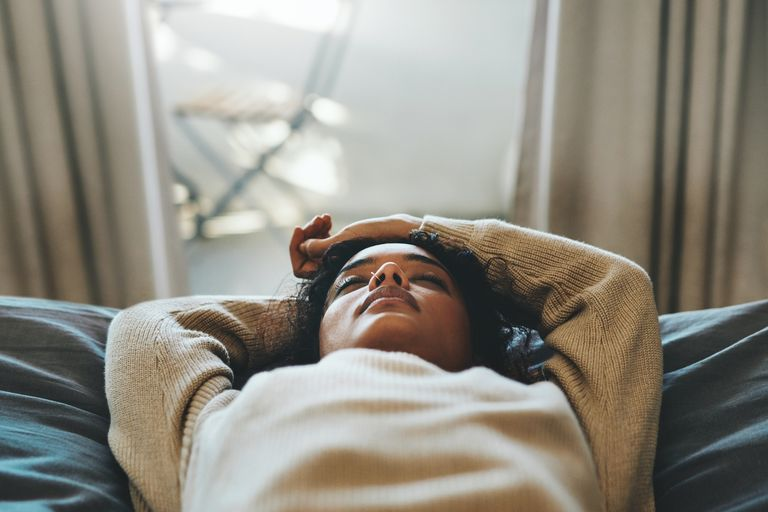How to Practice Mindfulness Meditation to Sleep More Soundly, According to Experts
You finally tuck yourself into bed knowing you have a busy day tomorrow, but you can’t seem to quiet your thoughts to doze off. You toss and turn, and the worry creeps in. Ugh, I’m going to be exhausted tomorrow. Of course, this line of thinking doesn’t help and keeps the vicious cycle going.
We’ve all found ourselves in this scenario, and that’s because how we sleep is deeply personal. A snooze-inducing strategy that works for one person isn’t guaranteed to help another night owl. But experts are starting to see lots of promise in calming practices that have steadily been spiking in popularity: mindfulness and meditation.
Especially during the COVID-19 pandemic, people really struggled with interrupted sleep, says Maryanna Klatt, Ph.D., professor in the Department of Family and Community Medicine at The Ohio State University College of Medicine. “When there’s unresolved issues, such as a lack of control, that’s when mindfulness can be even more effective to help you be okay with the fact that things are not okay,” she says.
But it’s not as simple as listening to a guided sleep meditation to help you drift off, says Jason Ong, Ph.D., director of behavioral sleep medicine at Nox Health and adjunct associate professor of neurology at Northwestern University Feinberg School of Medicine. “People think of [meditation] as kind of a substitution for medication in many ways, but it is really based and grounded on the principles of mindfulness and cultivating awareness of the present moment.”
Back up: What happens in your body when you can’t sleep?
To understand what Ong means, it’s helpful to have a little background about our physiology. “When it comes to sleep problems, especially for people with chronic insomnia, oftentimes they’re so caught up in trying to make sleep happen that it creates a sense of pressure that makes sleep less likely to happen,” says Ong. “Essentially, it activates the fight or flight response that is built in our body. When that gets activated, your body thinks that it needs to be on guard or vigilant and it tends to override the parts of your brain that regulate sleep and wake.”
How can mindfulness or meditation help improve your sleep?
Sleep tends to come a lot easier when you’re actually sleepy, but sometimes we hit the lights and get under the covers just because it’s “time for bed” without paying attention to whether that is the case—but mindfulness could change that.
“Our thinking is that by grounding yourself in the present moment and just being aware of what to look for, it gives you a better chance of reducing that fight or flight response,” says Ong. “A lot of people with insomnia go to bed because they’re tired of dealing with the day and they want to escape, but that’s not how the brain regulates sleep and wake. Meditation helps keep you from getting in your own way and it allows your brain to regulate sleep and wake based on how it naturally does.”
Wait, what’s the difference between mindfulness and meditation?
Yes, there’s a difference. Mindfulness is a way of being in the present moment with a relatively non-judgmental or non-reactive mindset and meditation can be a way to practice mindfulness, explains Michael Goldstein, Ph.D., a research fellow in the Sleep and Inflammatory Systems Laboratory at Beth Israel Deaconess Medical Center and Harvard Medical School.
Klatt notes that you can incorporate small aspects of mindfulness into your daily activities, such as paying attention to the feel of the water, texture of the sponge, and smell of detergent while you wash dishes.
As for meditation, Ong likes to use the metaphor of trainspotting. “It’s the activity where people just observe trains, usually standing on the platform or even away from the train station,” he explains. Sometimes trainspotters take photos or write down notes; they are interested in the qualities of the train, rather than using them for a ride.
Now, imagine that your mind is like a train station. “Your thoughts and emotions are like trains coming in and out,” say Ong. “Most of us use those thoughts to analyze, judge, or do something—like people who use trains for transportation.”
Should you meditate right before bed?
It really depends on whether you have chronic insomnia or occasional trouble falling asleep. For instance, one study found that two different types of meditation are linked to the release of melatonin, a hormone that promotes sleep.
But other research, including a small study that Goldstein and Ong worked on together, has found that people who received mindfulness training actually have activated brains during the night, similar to the brains of people with insomnia.
“Mindfulness and insomnia may actually both increase brain alertness,” says Goldstein. “It seems to be quite consistent with thousands of years of Buddhist philosophy, and other origins of these mindfulness practices that aim to cultivate relaxed alertness.” That arousal within the mind is expected with meditation and is not a bad thing.
“The best mindfulness practice is when you can take awareness or mindfulness towards everything you do during the day and sleep is just one of those things,” says Klatt. “But even if you’re mindful all day and you can’t let it go in order to get to sleep, then doing a meditation before you go to bed can be helpful.”
Because the effects can vary from person to person, you may have to experiment to see what schedule works best for you.


































